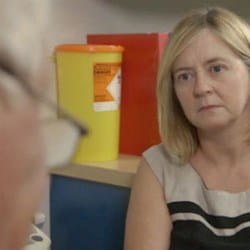CANCER patients diagnosed at stage 1 are five times more likely to have surgical treatment than those diagnosed at stage 4, avoiding the need for chemotherapy, according to new figures.
Cancer Research UK and Public Health England examined data from about half a million NHS patients with 22 different cancer types in England between 2013-2014 to show whether patients received surgery, chemotherapy and radiotherapy, alone or in combination, as compared with their cancer stage.
The figures showed shows that 70 per cent of cancer patients diagnosed at stage 1 had surgery to remove their tumour but this fell to 13 per cent of those diagnosed at stage 4. Chemotherapy was the treatment choice in 12 per cent of patients at stage 1 and this rose to 39 per cent of those diagnosed at stage 4.
Professor Mick Peake, a lead clinician in the study and based at Public Health England, said: "Doctors want to offer patients the best possible treatment. For some cancers, like leukaemia and lymphoma, that’s chemotherapy. But in most cases the earlier cancer is diagnosed the more likely it is to be effectively treated by surgery, and that means chemotherapy isn’t always necessary.
"In general, the treatment of cancers at an early stage also reduces the risk of long-term side effects which can affect patients’ quality of life."
Colon cancer patients in stage 1 underwent surgery in 94 per cent of cases, with radiotherapy and chemotherapy not usually necessary. In patients diagnosed with stage 4 disease, 32 per cent have surgery. Less than one in 20 colon cancer patients with the earliest stage disease have chemotherapy compared to 47 per cent diagnosed at the latest stage.
Almost 95 per cent of breast cancer patients diagnosed at stage 1 have surgery compared to 25 per cent diagnosed at stage 4, who are also more than twice as likely to receive chemotherapy.
Early stage non-small cell lung cancer is treated with chemotherapy in 6 per cent of cases, compared to 30 per cent when the diagnosis is made at the latest stage.
Sara Hiom, Cancer Research UK’s director of early diagnosis, said: "Understandably, people sometimes fear cancer treatments as well as the disease itself. This research shows how important an early diagnosis is for simplifying the treatment options as much as possible. Until now, we’ve not been able to look at such rich data for the whole of England and analyse who’s been treated how. Now, thanks to recent improvements, it’s possible to show how stage affects the treatments patients need, giving us a more complete picture.
"We all have our part to play to increase the number of patients diagnosed earlier. People should consult their GP if they are worried about symptoms, GPs should follow clinical guidelines to refer patients, and the right diagnostic tests need to be performed and reported promptly so that patients can benefit more from treatments. This all needs greater attention and our national cancer strategy helps give this focus."
Link: Chemotherapy, Radiotherapy and Surgical Tumour Resections in England
This page was correct at the time of publication. Any guidance is intended as general guidance for members only. If you are a member and need specific advice relating to your own circumstances, please contact one of our advisers.
Save this article
Save this article to a list of favourite articles which members can access in their account.
Save to library


